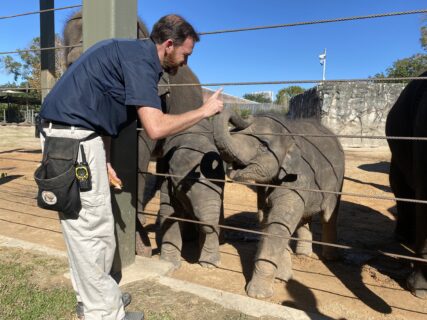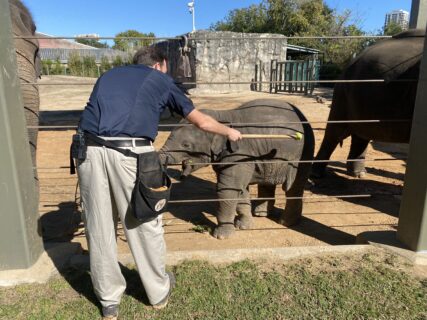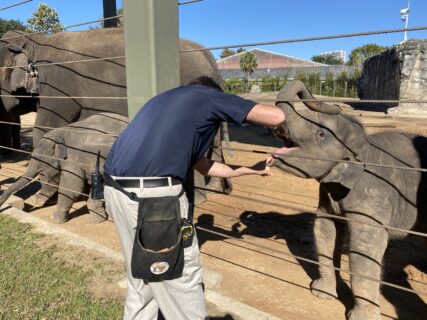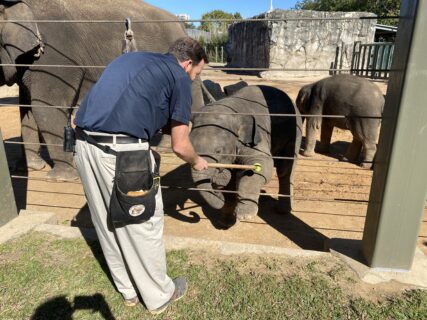Training our Elephant Youngsters

Just like the quality healthcare Legacy Community Health provides to its younger patients in the Houston community, our animal care teams provide extraordinary care to the animals at the Houston Zoo, including the youngest members of our Asian elephant herd. Earlier this year, we welcomed two elephant babies, Winnie and Teddy, and training is a vital part of their first year.
Formal training usually starts around three months old when they begin to start sampling solid foods. Our elephant zookeepers start getting the elephants used to being touched from the day they are born so they begin learning when they are just a few days old. Once they will take food from their keepers, usually soft foods like bread or banana, target training is introduced. Our elephants quickly start to realize that if they touch the target they receive food.
Elephant Manager Rob shares, “With Winnie being two months older than Teddy, she is more interested in food and keeper interactions, so she is more focused and calm during her training sessions.” “Whereas Teddy, being a bit younger, he likes to use his training interactions as a jumping off point for playing and roughhousing with others.”

From there, our keepers use the target to teach them to “lean in,” which means that they line up parallel to the exhibit structures inside the cow barn and yard to check, touch, and even bathe their sides. They also start using the target to teach them to lift up each of their feet so we can check their nails and pads. In addition, they are taught to open their mouths while holding their trunks on their heads to check their teeth and gums.

Daryl Hoffman, curator of large mammals shares, “A solid training foundation is one of the cornerstones to optimal welfare.” “We all know, food, medical care, and shelter (exhibit design), but training is just as equal in importance. Solid training allows our elephants to participate in their own medical care with husbandry behaviors. We can collect blood samples to monitor their health and reproductive status without anesthesia.”
Once bread and bananas are introduced, they then move on to produce that all of the elephants receive, including, apples, carrots, and sweet potatoes, and occasionally raisins. Solid food is important because it is one of the few tools our animal care teams have to reinforce the positive relationships they establish with the animals they care for. This type of “ask and reward” system allows our keepers to communicate to our elephants that they are doing positive behaviors and receive yummy food in return.
Here at the Zoo, all of the elephants willingly participate in their overall health. They are trained to stand and lay down for bath, lift feet so we can trim their nails, stand for injections, swallow pills, and the list goes on and on. The sooner our animal care teams can start these behaviors with the little ones, the better off they will be for the years to come.
Stay tuned for more to come on our youngest elephants, Winnie and Teddy, as they continue growing over the next year. And we hope to see you for a visit soon!

